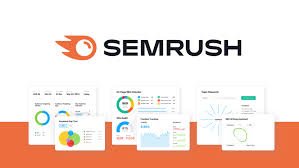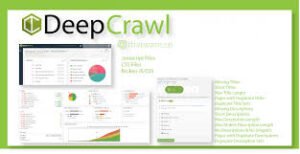Search Engine Optimization (SEO) is a crucial component of digital marketing, determining how well a website ranks on search engines like Google, Bing, and Yahoo. With millions of websites competing for visibility, businesses must leverage advanced strategies to stay ahead. Traditional SEO methods, while effective, often require significant time and manual effort. This is where Artificial Intelligence (AI) comes into play, revolutionizing how SEO is implemented and managed.
AI has transformed SEO by automating complex tasks, improving keyword research, optimizing content, and enhancing user experience. Machine learning algorithms analyze vast amounts of data to provide actionable insights, allowing marketers to make data-driven decisions. From predictive analytics to real-time adjustments, AI-powered tools are making SEO more efficient and effective than ever before.
In this comprehensive guide, we will explore the best AI tools for website SEO, their functionalities, and how they can improve search rankings. We’ll also discuss the benefits, challenges, and future trends of AI in SEO, helping businesses understand how to integrate these tools into their strategies effectively.
How AI is Transforming SEO
Automation of Repetitive SEO Tasks
SEO involves numerous repetitive tasks, such as meta tag optimization, internal linking, and site audits. AI tools automate these processes, saving time and reducing human error. For example, AI-powered crawlers can scan websites for broken links, duplicate content, and missing alt tags, providing instant fixes.
Improved Keyword Research and Content Optimization
AI analyzes search trends, user intent, and competitor data to suggest high-ranking keywords. Tools like SEMrush and Ahrefs use machine learning to predict keyword performance, helping marketers create content that aligns with search engine algorithms. Additionally, AI-driven content optimization tools ensure that articles are well-structured, relevant, and engaging.
Enhanced User Experience Through AI-Driven Personalization
Search engines prioritize websites that offer a seamless user experience. AI enhances UX by personalizing content based on user behavior, location, and search history. Chatbots powered by AI improve engagement by providing instant responses, while dynamic content adjustments ensure visitors find what they need quickly.
Better Data Analysis and Predictive Insights
AI processes large datasets to identify patterns and predict future trends. This helps SEO professionals adjust strategies proactively rather than reacting to algorithm updates. Predictive analytics can forecast traffic changes, keyword ranking fluctuations, and even potential drops in performance, allowing for preemptive optimization.
Top AI Tools for Website SEO
Keyword research is the backbone of any successful SEO strategy. Without the right keywords, even the best content may never reach its intended audience. AI has revolutionized this process by making keyword research faster, more accurate, and data-driven.
SEMrush: The AI-Driven Keyword Powerhouse

SEMrush is one of the most advanced AI-powered SEO tools available today. Its Keyword Magic Tool uses machine learning to generate thousands of long-tail keyword suggestions based on seed keywords. Unlike traditional keyword tools, SEMrush analyzes search volume, keyword difficulty, and competitor rankings in real time.
One of its standout features is the “Keyword Gap” analysis, which identifies keywords your competitors rank for but your website doesn’t. This helps businesses discover untapped opportunities. Additionally, SEMrush’s Position Tracking tool monitors keyword rankings daily, providing insights into fluctuations and suggesting optimizations.
Ahrefs: Uncovering Hidden Keyword Opportunities
Ahrefs is another industry leader that leverages AI for deep keyword research and backlink analysis. Its “Content Gap” tool is particularly powerful—it compares your website against competitors and reveals keywords they rank for that you’re missing.
Ahrefs also excels in search intent analysis. By using AI to categorize keywords into informational, commercial, and transactional intent, it helps businesses create content that aligns with what users are searching for. Its “Keyword Explorer” provides a “Parent Topic” feature, which groups semantically related keywords, making content clustering more effective.
AnswerThePublic: Mastering Question-Based SEO
With the rise of voice search and featured snippets, question-based keywords have become crucial. AnswerThePublic uses AI to compile commonly asked questions related to a keyword, helping businesses create FAQ-style content that ranks well in Google’s “People Also Ask” section.
For example, if you search for “best running shoes,” AnswerThePublic will generate queries like:
- “What are the best running shoes for flat feet?”
- “How to choose the best running shoes?”
- “Are expensive running shoes worth it?”
This tool is invaluable for bloggers, e-commerce sites, and local businesses looking to optimize for conversational search queries.
AI Content Optimization Tools: Writing for Both Humans and Search Engines
Creating high-quality content is no longer just about stuffing keywords—it’s about relevance, readability, and user intent. AI-powered content optimization tools analyze top-ranking pages and provide data-driven recommendations to improve on-page SEO.
SurferSEO: The AI Content Editor

SurferSEO is a game-changer for on-page optimization. It scans the top 20 ranking pages for a target keyword and generates a “Content Score” based on:
- Optimal word count (how long top-ranking articles are)
- Keyword density & placement (where to include primary and secondary keywords)
- Heading structure (H2s, H3s, and semantic keyword usage)
- Backlink and image recommendations
Writers and SEO specialists use SurferSEO’s real-time editor to adjust content before publishing, ensuring it aligns with Google’s ranking factors.
Clearscope: Ensuring Content Meets Search Intent
Clearscope uses natural language processing (NLP) to evaluate how well content matches Google’s top-ranking pages. It assigns a “Relevance Grade” based on:
- Keyword usage (primary, secondary, and related terms)
- Readability (Flesch-Kincaid score, sentence length)
- Content depth (coverage of subtopics)
Marketers use Clearscope to refine blog posts, product descriptions, and landing pages, ensuring they meet both user intent and algorithmic preferences.
Frase.io: AI-Generated Content Briefs
Frase.io automates content research by analyzing top-ranking pages and generating AI-powered briefs. It summarizes key points from competing articles, identifies missing subtopics, and suggests semantically related keywords.
Additionally, Frase offers an AI content writer that drafts SEO-friendly articles based on research. While human editing is still necessary, this feature speeds up content creation significantly.
AI for Technical SEO Audits: Fixing Hidden Website Issues
Technical SEO ensures that search engines can crawl, index, and rank a website efficiently. AI-powered audit tools automate the detection of technical issues that could harm rankings.
Screaming Frog: The Ultimate SEO Crawler
Screaming Frog is a must-have tool for SEO audits. It crawls websites (like Googlebot) and identifies:
- Broken links (404 errors)
- Duplicate meta tags & titles
- Missing alt text on images
- Slow-loading pages
- Redirect chains & loops
The tool integrates with Google Analytics and Search Console, allowing for deeper analysis of crawlability and indexing issues.
DeepCrawl: Enterprise-Level Technical SEO

DeepCrawl is designed for large websites (10,000+ pages). It uses AI to:
- Detect orphaned pages (pages with no internal links)
- Analyze JavaScript rendering issues (critical for SPAs)
- Monitor log files to see how search engines crawl the site
- Identify duplicate content at scale
E-commerce giants and publishers rely on DeepCrawl to maintain peak technical SEO health.
Botify: AI-Powered Log File Analysis
Botify helps businesses understand how search engines interact with their site. By analyzing server logs, it reveals:
- Which pages Googlebot crawls most frequently
- Crawl budget wastage (pages that shouldn’t be indexed)
- Blocked resources affecting rendering
This data helps SEOs optimize crawl efficiency, ensuring that important pages get indexed faster.
AI for On-Page and Off-Page SEO: A Holistic Approach
MarketMuse: AI-Driven Topic Clustering
MarketMuse uses AI to map content gaps and improve topical authority. It analyzes a website’s existing content and suggests:
- New articles to cover missing subtopics
- Internal linking opportunities
- Content updates to boost rankings
This tool is ideal for content-heavy websites looking to dominate their niche.
BrightEdge: Real-Time SEO Adjustments
BrightEdge leverages AI to predict ranking changes before they happen. Its “DataCube” technology tracks:
- Algorithm updates (and their impact on rankings)
- Competitor movements (new backlinks, content changes)
- Voice search trends
Businesses use BrightEdge to stay ahead of SEO shifts and adjust strategies proactively.
Outranking.io: AI for Content Strategy & Backlinks
Outranking.io combines content optimization and backlink analysis. It helps with:
- Finding link-worthy content ideas
- Analyzing competitor backlink profiles
- Generating outreach templates for link-building
This makes it a one-stop solution for both on-page and off-page SEO.
AI Chatbots & Voice Search Optimization: The Future of SEO
ChatGPT for SEO Content Generation
ChatGPT assists in:
- Writing meta descriptions
- Generating blog post outlines
- Creating FAQ sections
While it shouldn’t replace human writers, it speeds up content production.
Google’s Bard & Gemini for Voice Search
These AI models analyze natural language queries, helping businesses optimize for:
- Conversational keywords (“Hey Google, where’s the nearest pizza place?”)
- Featured snippets (position zero rankings)
AI Chatbots (Drift, ManyChat) for Engagement
Chatbots improve dwell time and reduce bounce rates by:
- Answering customer queries instantly
- Guiding users to relevant pages
This enhances user experience, a key Google ranking factor.
Final Thoughts
AI is no longer optional for SEO—it’s a competitive necessity. From keyword research to technical audits, AI tools save time, improve accuracy, and boost rankings. Businesses that embrace these tools will dominate search results in 2024 and beyond.
Benefits of Using AI for SEO
Revolutionizing Data Processing and Analysis
The advent of AI in SEO has fundamentally transformed how we handle data analysis. Traditional manual methods of parsing through analytics reports, search console data, and ranking metrics could take days or even weeks of painstaking work. AI-powered tools now accomplish this in mere seconds, processing millions of data points simultaneously to deliver actionable insights. This quantum leap in processing speed enables marketers to:
- Detect ranking fluctuations in real-time
- Identify emerging search trends as they happen
- Spot technical issues immediately after they occur
- Monitor competitor movements with up-to-the-minute accuracy
Platforms like Google’s RankBrain and third-party tools leverage machine learning algorithms that continuously improve their analytical capabilities. They don’t just report numbers – they interpret patterns, predict trends, and recommend specific actions. For instance, an AI system might analyze a sudden traffic drop and immediately correlate it with recent algorithm updates, competitor content changes, or technical crawl errors, providing a comprehensive diagnosis that would take human analysts days to uncover.
Precision-Tuning Content for Maximum Impact
Modern AI tools have elevated content optimization from guesswork to science. By analyzing thousands of top-ranking pages across industries, AI systems have developed an intricate understanding of what makes content successful in search results. This goes far beyond simple keyword density metrics to encompass:
- Semantic Analysis: Advanced NLP (Natural Language Processing) evaluates how well content covers all aspects of a topic, ensuring comprehensive treatment that satisfies user intent.
- Contextual Understanding: AI can now discern between superficial keyword usage and genuinely valuable content that demonstrates expertise.
- EEAT Optimization: Tools like Clearscope and MarketMuse evaluate content against Google’s Experience, Expertise, Authoritativeness, and Trustworthiness framework, suggesting specific improvements to boost credibility signals.
- Engagement Prediction: Some platforms use AI to forecast how users might interact with content based on historical data, allowing for pre-publication optimization of elements like CTAs, internal links, and content structure.
This level of analysis ensures content isn’t just optimized for algorithms, but genuinely serves user needs – which ultimately leads to better rankings and engagement.
The Efficiency Revolution in SEO Operations
The operational benefits of AI in SEO represent nothing short of a paradigm shift for digital marketing teams:
1. Labor Cost Reduction:
- Automated audits eliminate the need for manual technical reviews
- AI-generated content briefs reduce research time by 60-80%
- Automated reporting saves dozens of hours monthly
2. Campaign Acceleration:
- Keyword research that once took weeks now happens in hours
- Content optimization occurs in real-time during writing
- A/B testing of meta data happens at scale automatically
3. Precision Elimination of Guesswork:
- Predictive analytics forecast ranking potential before publication
- Algorithm change impact assessments happen proactively
- Content gap analysis ensures strategic coverage
4. Scalability:
- Manage thousands of pages with the same effort as dozens
- Maintain consistency across global multilingual sites
- Replicate successful patterns across entire content libraries
Perhaps most significantly, these efficiency gains don’t come at the cost of quality. AI-enhanced workflows often produce better results than manual methods because they’re based on comprehensive data analysis rather than human intuition alone. The combination of machine efficiency and human creativity creates an unstoppable SEO advantage for businesses that implement these tools effectively.
The cumulative effect is that SEO teams can now accomplish in one month what previously might have taken a quarter, while simultaneously improving the quality and impact of their work. This accelerated, insight-driven approach to search optimization is rapidly becoming the standard for industry leaders, leaving slower-moving competitors at a significant disadvantage.
Adaptability to Algorithm Changes
Search engines frequently update their algorithms. AI tools monitor these changes and adjust strategies automatically, minimizing ranking drops.
Challenges and Limitations of AI in SEO
Over-Reliance on AI Without Human Oversight
While AI is powerful, human judgment is still needed to ensure content quality and brand alignment. Over-automation can lead to generic or irrelevant content.
Potential for Generic or Low-Quality AI-Generated Content
AI tools like ChatGPT can produce content quickly, but it may lack depth or originality. Manual editing is essential to maintain authenticity.
Privacy and Data Security Concerns
AI tools collect vast amounts of data, raising concerns about privacy breaches. Businesses must use reputable tools with strong security measures.
Future of AI in SEO
AI-Driven Voice and Visual Search Optimization
As voice assistants and image search grow, AI will optimize content for spoken queries and visual recognition.
Increased Use of Natural Language Processing (NLP)
NLP helps AI understand context better, improving content relevance for complex search queries.
Predictive SEO and Real-Time Adaptive Strategies
AI will soon predict ranking changes before they happen, allowing businesses to adjust strategies proactively.
Conclusion
AI is revolutionizing SEO by automating tasks, improving keyword research, and enhancing content optimization. Tools like SEMrush, SurferSEO, and ChatGPT are making SEO more efficient, helping businesses achieve higher rankings with less effort. However, human oversight remains crucial to ensure content quality and brand consistency.
As AI continues to evolve, its role in SEO will expand, particularly in voice search, NLP, and predictive analytics. Businesses that integrate AI tools into their SEO strategies will stay ahead of competitors and adapt to changing search engine algorithms seamlessly.
The future of SEO lies in the synergy between AI automation and human expertise. By leveraging AI responsibly, marketers can maximize efficiency while maintaining authenticity, ensuring long-term success in the digital landscape






